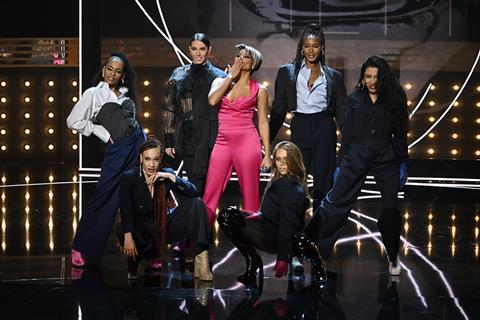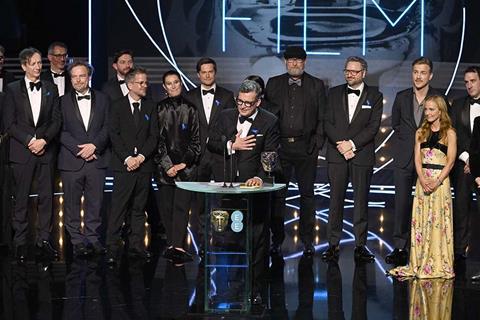
Screen’s group of anonymous Bafta voters reflect on the Bafta ceremony, the winners, the presenters (*Why was Geri Halliwell there?”) and what they would like Bafta to consider for next year.
Producer 1, female, Bafta voter
What did you make of this year’s ceremony?`
I watched it at home and enjoyed it – there was room for improvement but it felt fresher and more intimate in the new venue. I don’t think Alison Hammond was prepped enough, which was not her fault and a shame, but I could see what they were trying to do and pairing her with Richard E Grant (it would have been great to have had someone like Adjoa Andoh present with him). I thought the interviews with the winners and others was a good idea but somehow the execution didn’t work so well – not sure why Geri Halliwell was there on a night celebrating cinema! Would have been better to have had these interviews backstage. The final live awards were a good addition.
Were you generally happy with the winners? Any disappointments?
This year’s ceremony featured musical numbers only by women of colour: Ariana DeBose, Little Simz and Joan Armatrading. Angela Bassett, Viola Davis, Cynthia Erivo presented awards like film goddesses, which made the painful and sobering fact that there were no winners of colour even more strange. This really highlighted for me the chasm between what Bafta and the industry want to be celebrating, and the reality of voting and the winners who were predominantly white men. This is of course due to the huge success of All Quiet On The Western Front and The Banshees Of Inisherin, but there were diverse and deserving nominees. I would have liked to have seen Michelle Yeoh or Viola Davis win best actress. It would have been good for the Bafta voters to have spread the love more.
What changes would you urge Bafta to make for next year?
I still believe outstanding British film should be decided by voters in the UK only – otherwise this award goes to films which land internationally and are generally bigger budgeted. I would urge Bafta to give much more time for viewing with the nominations voting round – a week is not enough. This also impacts the winners. Bafta should review how the ceremony is produced, as there is a line between making it popular for those at home watching TV and safe-guarding the quality and impact of the night.
Screenwriter, male, Bafta voter
What did you make of this year’s ceremony?
I watched on BBC iPlayer and enjoyed it on the whole. I’ve worked on awards ceremonies and it’s much easier to criticise them than it is to make them. Richard E. Grant’s script was witty without taking aim at the nominees. I was less keen on the interview segments as they stopped the ceremony building up any momentum, but when the two hosts were on stage together, that worked better.
Were you generally happy with the winners? Any disappointments?
All worthy winners, if not necessarily all the nominees I was wanting to triumph. I was hoping for a more diverse winners’ photo and I expect Bafta were as well. If we’ve learnt one thing over the last four years, it’s that Bafta voters are really into the First World War. I expect my choices will do better at the Oscars.
What changes would you urge Bafta to make for next year?
Contenders should lose a thousand votes for every minute of a film’s running time over two hours. And they should add a separate category called ‘Olden Day Stuff With Only White People In It’. In terms of the ceremony, why not have an interview show straight afterwards? Then you could show more actual awards. And ask the chicken shop date person [Amelia Dimoldenberg] to do the red carpet.
Distribution executive, female, Bafta voter
What did you make of this year’s ceremony, either in the room or at home?
I watched it in parts and highlights as I was at the Berlinale, but then I watched the ceremony properly and in full on BBC iPlayer. I had missed the in-between interviews backstage… not sure what to make of them. They seemed a bit random, not very well researched and maybe uncomfortable for the talent. There’s a seed of a good idea there but needs to be flushed out further so it’s more thoughtful and less frenetic.
Were you generally happy with the winners? Any disappointments?
I am happy that an international film not in the English-language did so well but I think there were many other possible outcomes to the evening, where the awards were more spread out across films and categories. I was surprised that Everything Everywhere All At Once didn’t win more than best editing, but maybe it’s more of an Indie Spirit and Oscar frontrunner.
I was hoping for Cate Blanchett to win for Tár and she so deservedly did – her speech was very moving about the time and space that her family allowed her to play the role. I was pleasantly surprised by Austin Butler winning best actor, who really was great at Elvis. It was so nice that he thanked his movement coach. I wasn’t disappointed by any of the awards, especially the great recognition of The Banshees Of Inisherin in acting, writing and production, but I would like to have seen The Quiet Girl win. It’s been a good year for Ireland.
What changes would you urge Bafta to make for next year?
Is there a way to make the Baftas more celebratory of the British film industry specifically? It’s a tough one to manage because it is also a celebration of filmmaking and filmmakers of the year. The moves towards greater diversity and inclusivity are notable and I appreciated Bafta chair Krishnendu Majumdar’s opening words and his reference to our “shared passion for film”. Let’s see where it goes from here.
Producer 2, male, Bafta voter
What did you make of this year’s ceremony?
I watched the ceremony at home. I enjoyed the bonkers ‘Angela Bassett did the thing’ rap by Ariana DeBose, but the interview segments were really out of place – and what the heck was Geri Halliwell doing there? Her only connection seemed to have been having been in a film with host Richard E. Grant 26 years ago [Spice World]. I know there’s a need to make the ceremony appealing to TV viewers but the contrast between proper cinema star power and the more naff elements felt strangely heightened this year.
Were you generally happy with the winners? Any disappointments?
I thought it was great All Quiet On The Western Front did so well – they should have showed the speech from the writers though. Charlotte Wells deserved her prize [for outstanding British debut] and I loved her speech. It was terrific the Academy honoured the brilliant Sandy Powell with the Fellowship. As has been said a lot, it was disappointing that again there was such a contrast between the diversity of the presenters and the winners of the awards. Clearly there’s a lot more work to be done on that front.

Exhibition analyst, male, Bafta voter
What did you make of this year’s ceremony, either in the room or at home?
I rarely watch the ceremony unless I’m there since it doesn’t show live and it’s usually quite a painful watch. Although they included the last few awards live this year I chose to go to the cinema Sunday night instead and checked the winners when i came out.
Were you generally happy with the winners? Any disappointments?
Although few of the nominees I voted for won, I am generally happy with the winners. I would have liked to see Everything Everywhere All At Once do better, especially in screenplay and for Ke Huy Quan, but I’m expecting that to be redressed at the Oscars (fingers crossed)
Unfortunately I think Everything Everywhere is a film that benefits from repeat viewings and I’m not sure many people have time for that in awards season. Also I understand the technicality of why Banshees is British but I’m with Martin McDonagh, that felt like an odd win and I’d quite like to see films nominated for best film excluded from the other film categories in order to give other titles a chance.
What changes would you urge Bafta to make for next year?
I think more time is needed on first-round voting, whether that is through an earlier deadline for finalising submissions or just giving the members more time, but the first round is where there are most films to consider and if Bafta truly want to give more films an equal chance they need to give members more time to watch them. This year’s voting cut off was in December - the earliest I’ve seen it. Then maybe the jury jerry-rigging would be less necessary.
I think the jury correctives have generally proven to be a good thing but I think they should be an “in case of” rather than a rigid set thing, which would allow possibility that the chapter vote could be the only vote since the chapters are the true experts.
Producer 3, female, Bafta voter
What did you make of this year’s ceremony?
After some incredibly exciting, richly diverse nominations, one can’t help but be frustrated by THAT winners’ photo, too easy an opportunity for the media to label these Bafta awards as failing in their aim of inclusion. Photos can be deceptive, and a closer look shows that many forms of discrimination in our industry are being dismantled, slowly but surely, although some are proving harder than others to address, and real, substantive outcomes still feel out of reach. We have to do better when it comes to representation in our industry at every level, including the apex that is the roster of Bafta award winners, not least because we should be at the fore of inclusivity in the workplace, leading the way for other sectors and industries that look to us and are, after all, our audiences.
And of the winners in general?
That said, we mustn’t fail to acknowledge those who earned their gongs. Not least, I was delighted to see Charlotte Wells collect her award for best debut from a British writer, director or producer and Barry Keoghan collect his for best supporting actor. The surprise on the night, for me, was Austin Butler’s award for best actor for Elvis. While I thought he was mesmerising, I hadn’t heard much positive chatter about him or the film. I heard (and talked… I confess!) more about Tom Hanks’ bizarre scenery-chewing performance as Colonel Tom Parker, and I feared they’d been tarred with the same brush and dismissed by bemused Bafta voters. No so, and I think it’s a deserving win.
Edward Berger’s suitcase must have been tipping the scales on his flight home, because the big winner on the night was All Quiet On The Western Front. I think it is an impressive film, but I think voters like it in a very earnest, chin-stroking, sincere cinephile kind of a way. I worry it is not a film that makes non-industry audiences excited about our offerings, about going to the movie theatre for popcorn and pick-n-mix and dinner afterwards to talk about what you have seen. I want more of those movies, please.
What changes would you urge Bafta to make for next year?
Do we really have to have a ceremony at all? What are the imperatives driving the ceremony (live and televised)? I’d love to understand if it is an economic driver for Bafta. Or if it is about perceived cultural collateral and reputation? For my part, I like to save my energies for the morning after’s post-match analysis, reading through the list of winners and ogling at the outfits. My vote for best dressed this year went to Florence Pugh. Glorious.

Producer 4, male, Bafta voter
What did you make of this year’s ceremony?
Being in the room –which I wasn’t this year – you feel the collegiate atmosphere of the industry coming together to recognise exceptional work. In that sense a ceremony that can sometimes feel insular works for attendees. But that is all lost when watching at home, and it still doesn’t feel like the right format for a broadcast has been found. Too many toe-curling handovers, a general awkwardness, and the sofa commentary just didn’t elevate it.
Were you generally happy with the winners? Any disappointments?
I was very surprised not to see Paul Mescal or Bill Nighy win for best actor, but at the same time it’s hard to argue with Austin Butler winning. The truth is at this stage most nominees are truly deserving winners and it’s something of a lottery. It’s certainly a shame that more home-grown films didn’t come away with awards, but again All Quiet On The Western Front is a great film.
What changes would you urge Bafta to make for next year?
There’s rightly been consternation that there wasn’t more diversity among the nominees and winners. Maybe some tweaking to the voting process can help that again. But we also have to look at the wider industry. Bafta doesn’t exist in a vacuum and are we making enough films about and by film makers from different backgrounds? The decision makers are still from a narrow pool, and it’s inevitable that affects the work being made. We’ve all got more work to do.
Casting director, female, Bafta and Ampas voter
What did you make of this year’s ceremony?
I thought Richard E Grant was the best host ever. The combination of his style, warmth, wit and full-hearted love of film came across so well and engaged us all in the room.
Were you generally happy with the winners? Any disappointments? I was disappointed that a person of colour didn’t win best actress. The year was so strong: Michelle Yeoh, Viola Davis, Danielle Deadwyler. Cate didn’t need it. I was also disappointed that the director of All Quiet On The Western Front didn’t mention his casting director Simone Barr, who died a few weeks ago. She was an incredible person and did a fantastic job on the film. Without that cast, would the film have won so many awards? I feel that Simone’s work should have been acknowledged.
What changes would you urge Bafta to make for next year?
Bafta should spend all year schmoozing Richard E Grant, to make sure he will host again!
Executive, male, Bafta voter
What did you make of this year’s ceremony?
Great, until it wasn’t. The venue works very well (although the red carpet didn’t feel as special as the Royal Albert Hall), and it started well, but Richard E Grant didn’t get the laughs that were perhaps intended, and all the backstage stuff fell flat and felt like filler to allow us to catch up to the live broadcast.
What did you make of the winners?
It should have been clear from the longlist and noms that All Quiet would dominate, but no-one quite believed it until it happened! Worthy winner in many ways, but I was personally disappointed that Kazio Ishiguro didn’t win screenplay for Living, nor Colin Farrell forBanshees.
What changes would you urge Bafta to consider making for next year?
I would lose the backstage stuff. Consider a new host. Someone quicker and more of a trained comedian.

























No comments yet